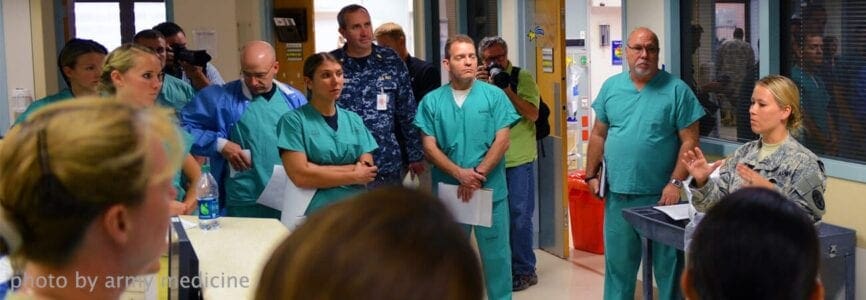Bioethics Forum Essay
Responding to Ebola: Retrofitting Governance Systems
As of September 15th, President Obama has guaranteed to deploy 3,000 troops to Liberia to help with the construction of a 1,700 treatment bed facility. The U.S. military will supply engineers to aid building and other service members to help train local health care workers. Partly motivating this action is Obama’s concern that Ebola presents a global security risk to the U.S. Further, he stated on September 16th, “[T]his is an epidemic that is not just a threat to regional security – it’s a potential threat to global security if these countries break down, if their economies break down, if people panic.”
Public health emergencies allow designated officials to take extraordinary actions – ones that signify expansive powers, often beyond legislative approval – to contain and manage imminent threats. The latest U.S. intervention follows from a direct plea from the Liberian President, Ellen Johnson Sirleaf, who worries that the Ebola outbreak may erupt into civil chaos. Further, there is fear that if Ebola spread to an unstable state such as South Sudan, which has banned foreign aid workers, the results would be grave.
The U.S. humanitarian obligation to aid now requires a militaristic response, but a sound local infrastructure might have prevented some of the misinformation and fear that created this epidemic. Peter Piot, the microbiologist who helped to identify the Ebola virus, stated that there is no way for the West African countries to handle it on their own, and advocated for a “quasi-military intervention.” While this type of involvement may be most needed at this juncture, it predicts far reduced civil liberties. Quarantine measures in any case would limit civil liberties, but when enforced by a foreign military, it presents no incentive for West African governments to create a health structure that adequately forecasts their needs.
It is not enough to look towards Liberia, Sierra Leone, Nigeria, Senegal, and Guinea and claim that they do not have enough resources. Instead, there needs to be a greater discussion of a stable, transparent government’s effects on public health crises. Some nations in West Africa, like Sierra Leone, only recently emerged from years of civil war, and the development of news media outlets represents a goal for constitutional democracies. Historical cases, such as the SARS epidemic of 2003, suggest a correlation between suppressing information and increasing risk in the context of public health emergencies. The Chinese communist government suppressed factual reporting of the SARS epidemic and international organizations later harshly criticized these acts of censorship for creating conditions that delayed disease containment.
However, in the case of the present outbreak, the media in Sierra Leone have begun playing an active role in dispelling rumors about Ebola and providing life-saving information. BBC Media Action, the BBC’s international development charity, have begun working with their 35 partner stations across Sierra Leone to confront misinformation about the Ebola virus through a new radio program called Kick Ebola Nar Salone (Kick Ebola out of Sierra Leone). The program has featured interviews with health officials such as one nurse who survived Ebola and encouraged Sierra Leoneans to seek early treatment and to quarantine themselves for their families’ safety.
It needs to keep being asked, why do global public health emergencies continue to catch the world off-guard? The Ebola crisis has inspired extraordinary, and now militaristic, efforts from the U.S. that have characterized its responses to other public health emergencies. As Brooks and others have suggested, a failure to build institutions that correct for long-running problems, including a lack of health infrastructure, is at the heart of this Ebola crisis. Better health planning and resources are required, but also capacity-building for accurate information. The inequities between Americans and those in West Africa become most stark in the midst of disaster, when international obligations to support vulnerable communities often come to light. For an epidemic to be adequately addressed, those preexisting inequities should be a focus before emergency efforts are taken.
Mohini Banerjee and Chelsea Jack are research assistants at The Hastings Center.
Posted by Laura Haupt at 09/18/2014 05:01:11 PM |












